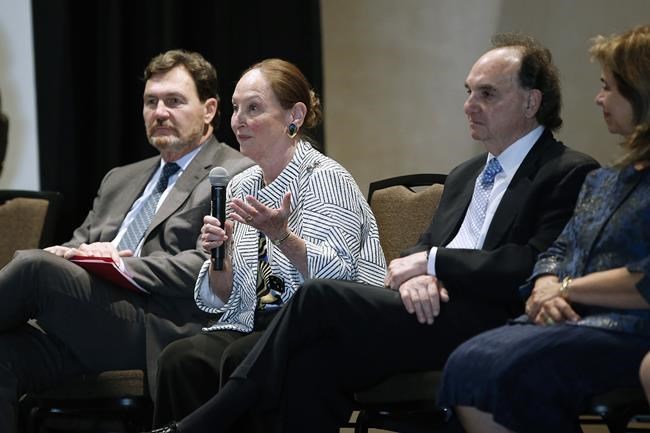OTTAWA — Before hearing her last Supreme Court case Friday, Justice Rosalie Abella recalled the many opportunities she welcomed in her path-breaking career, but saved the most heartfelt words for her family.
Abella's mandatory retirement will take place July 1, on her 75th birthday. However, she will continue to work for six months on judgments in cases that she has heard.
Chief Justice Richard Wagner thanked Abella for being a champion of equality rights, playing an instrumental role in developing the court's jurisprudence in this and other areas "with passion, with dedication and limitless energy."
Wagner noted she is also an avid musician and art collector whose office is filled with fine pieces.
"Legend has it that Justice Abella's enthusiasm for hanging some of that art herself, using a very tall ladder, explains why she had to use a cane on the day of her swearing-in ceremony."
Born to Holocaust survivors, Abella came to Canada with her family as a refugee.
She was appointed to the Supreme Court 17 years ago after serving on the Ontario family court and the province's Court of Appeal.
She remembered Friday that friends tried to dissuade her from accepting the family court appointment, suggesting she await a spot on the federal trial bench.
"People like me — female, Jewish immigrant, refugee — weren't exactly being appointed to the bench in droves," Abella said.
"So really all I was aspiring to do when I graduated from law school with five other women was to be a really good lawyer. But if somebody wanted to make me a judge, who was I to say no to the opportunity? After all, immigrants live for opportunities, not entitlements."
Abella authored an Ontario study on access to legal services by people with disabilities and was the sole commissioner of a 1984 federal royal commission on equality in the workforce, coining the term "employment equity."
Abella served as chair of the Ontario Labour Relations Board and later the province's Law Reform Commission, and she became a visiting professor at Montreal's McGill University.
"It was chutzpah in full flight," she said of the "wonderful opportunities to learn about law, about people, about policy, about life."
Abella suggested her story parallels that of a generation which posed questions about who was in the mainstream and who was not.
"And if they weren't, why not? We questioned the role of women, of persons with disabilities, of Indigenous persons, of race, of religion, of gender identities, of bilingualism, of multiculturalism and of the role of law itself," she said.
"And all this made us question the role of courts, because all of the social, political and economic realignments that were happening around us meant that judges could no longer just be defenders of the status quo. We had to accept that justice was the application of law to life, not just the application of laws to facts."
Her life in the law has been intellectually fulfilling, Abella said, but her real life — the life of her heart — rests on the love she feels for her family.
She and husband Irving Abella, an accomplished historian, have two sons, Jacob and Zachary, both lawyers.
"Thank you for filling my life with so much love, pride, gratitude and happiness," she said of her extended family.
"My final thoughts are with two people who aren't here but are always with me. This day, like everything else in my life, would not be possible without my parents."
This report by The Canadian Press was first published May 21, 2021.
Jim Bronskill, The Canadian Press



